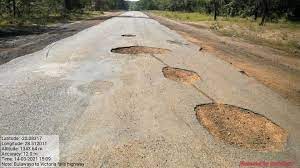The CEO of Zimbabwe’s National Road Administration (Zinara), Nkosinathi Ncube, has apologised to stakeholders for the deplorable state of the Bulawayo-Victoria Falls Highway, which is now littered with potholes.
Speaking during an Infrastructure Summit and Expo hosted by the National Economic Consultative Forum yesterday, Zinara chief executive officer, Mr Nkosinathi Ncube Ncube attributed the damage to the Bulawayo-Victoria Falls Highway to haulage trucks that transport heavy cargo from the coal mines in Hwange, saying that the loads should have been transported by rail.
Ncube added that sustained maintenance of such infrastructure is a challenge due to the funding gap linked to the limited fiscal space. He noted that farmers were also incurring high transport costs due to the use of road transport instead of rail, and bemoaned non-compliance in paying road user fees, with about 30 percent of road users not compliant, thus frustrating efficient service delivery. He said:
Apologies to those who drove from Bulawayo to Victoria Falls, I am sure you saw the type of road we have. We fund and maintain these roads and the contractor (Bitumen World Private Limited) is on the ground to work on the worst affected sections of the road… In January we got a good budget for roads but all this has been eroded and is now inadequate hence in some places you see contractors abandoning the project sites. We have to address this working with the Ministry of Finance.
The road is a strategic connection to Victoria Falls, Zimbabwe’s prime tourism destination, and is critical for regional trading within the north-south corridor, linking Zimbabwe with South Africa, Zambia, Botswana, and Namibia. He stated that work to rehabilitate the worst-affected sections of the road had commenced and blamed non-compliance in paying road user fees for frustrating efficient service delivery.
Ncube noted that Zimbabwe lacks access to critical global lines of credit and development partner support, compounded with a lack of skilled personnel and procurement bottlenecks, limiting the country’s ability to effectively rehabilitate and maintain its roads. He emphasized the need for a holistic approach to steer sustainable road development and harness modern models that involve communities and private sector players as beneficiaries.
Ncube cited a World Bank-assisted study and lauded the success of partnerships demonstrated by the building of the Plumtree-Bulawayo-Harare-Mutare Highway by Group Five of South Africa.
Source PindulaNews












